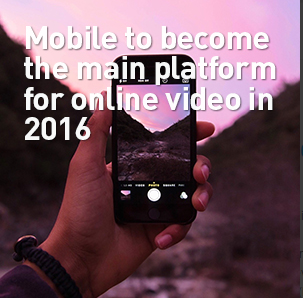 This year mobile devices will overtake ‘fixed devices’ to become the main platform for viewing online video, according to Zenith’s Online Video Forecasts 2016, published today.
This year mobile devices will overtake ‘fixed devices’ to become the main platform for viewing online video, according to Zenith’s Online Video Forecasts 2016, published today.
Consumers around the world will spend an average of 19.7 minutes a day viewing online videos on their mobile devices (smartphones and tablets), compared to 16.0 minutes on fixed devices (both desktop computers and smart TV sets). This represents a 39% leap for mobile on last year’s figures, when 14.2 minutes were spent viewing mobile video. Fixed video consumption will be static this year, reflecting higher viewing on smart TVs counterbalanced by the viewing lost from desktops to smartphones and tablets.
This is the second edition of Zenith’s Online Video Forecasts report, which is published annually. It contains historical data and forecasts of online video consumption and advertising, together with commentaries on the development of individual markets by local experts. This year’s edition covers 57 key markets, up from 40 in the first edition.
The rapid growth in mobile video consumption is being driven by the growing popularity of mobile devices, particularly low-cost devices in lower-income countries; the development of better mobile displays; and the spread of high-speed data connections, particularly 4G. We forecast mobile video consumption will grow 33% in 2017 and 27% in 2018, to reach 33.4 minutes a day. Mobile devices will account for 64% of all online video consumption in 2018. Fixed video consumption will grow 13% in 2017 and 3% in 2018 to reach 18.7 minutes as smart TV viewing becomes more common.
Online video adspend to grow 20% a year
Advertisers spent US$17.5bn on online video ads in 2015, up from US$13.4bn in 2014. We forecast online video adspend to grow at an average rate of 19.8% a year, reaching US$30.1bn in 2018. This will increase online video’s share of digital display adspend to 31.3%, up from 26.7% in 2015. Online video (as well as social media) is rapidly taking market share from traditional banners, which are less effective and more disliked by consumers, particularly on mobile devices.
Most video adspend will be fixed until 2018
Although most online video consumption is mobile, the majority of expenditure on online video advertising goes to fixed devices, and will continue to do so in 2017. We estimate that fixed video ads will account for 68% of all online video advertising this year, down from 75% last year. It’s not until 2018 that we expect mobile advertising to equal fixed. Video ads are more engaging and effective on larger screens, so advertisers will continue to pay a substantial premium for fixed video ads.
Online video advertising complements television
In many markets it is becoming common for brands to treat online video as a complement to traditional television, rather than as a competitor. Online video can add incremental reach to television campaigns, particularly among the young and well-off consumers who tend to be the heaviest users of online video. In smaller markets, advertisers often simply reuse their television ads, but this is not the most effective way of using online video: online video ads normally work better when they are shorter than traditional 30 second spots. Some brands have found success by using online video to provide extended content to interested consumers – by extending the story of the television campaign, for example. As we have noted in our Advertising Expenditure Forecasts reports, television and online video are increasing their combined share of global display advertising – i.e. advertising expenditure across all media except digital search and classified. In 2015 television and online video accounted for 48.5% of global display, up from 43.8% in 2010, and by 2018 we expect them to account for 49.6%.
“The spread of mobile devices and high-speed connections means consumers will have online video content at their fingertips throughout the day.” said Jonathan Barnard, Head of Forecasting at Zenith. “This creates new opportunities for advertisers to communicate with consumers, using online video ads to combine the brand-building power of audiovisual advertising with pin-point targeting and personalization.”


